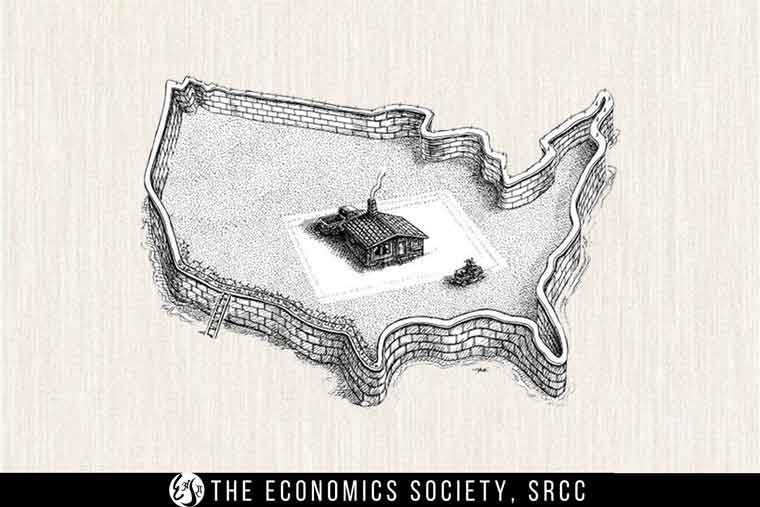
Published in:
Global
US Isolationism and the New World Order

Post WWII, the United States of America has prided itself on being the strongest advocate of capitalist system and a free society based on the principles of market economy and free trade. It managed to bring the world together and successfully built a global coalition around its economic ideology that paved the way for its near hegemony in terms of wielding influence in global policy making. The 32nd President of USA, Franklin D. Roosevelt, led the world in rebuilding the economy through an unprecedented series of reforms called as “New Deal” as well as introducing lend-lease program which laid the foundation for “Marshall plan” (1948), an initiative to provide foreign aid to war torn countries, lift trade barriers, modernize industry and prevent the spread of communism.
The United States of America has indeed come a long way from being a global leader which is rallying nations around its efforts to address crucial issues, to now being an isolationist driven by its own geo-political vested interests. Further, the new world order is increasingly based on multipolarity and multilateralism with multiple power centers (US, Russia, EU, China) asserting themselves, with each commanding a significant degree of clout in their respective regions as well as globally. As a result, the US is forced to compete with many players trying to get a slice of global power. However, in this competition, it has begun a new trend of it pulling out of major international organizations and important treaties signed to ensure world stability and peace.
Recently, the Trump administration has decided to formally start the process of withdrawal from the World Health Organization (WHO) with effect from July 6, 2020. Well, under normal circumstances, we could have engaged in an academic debate as to whether US taking a backseat in offering support to manage global problems is right or wrong, but there is a pandemic raging through the world that requires global unity, cooperation and resources to keep the novel coronavirus in check and avoid economic depression. At present, there is still a massive shortage of masks, ventilators, personal protective equipment (PPE) and other necessary equipments in several countries where the virus is spreading like wildfire. Amidst this crisis, the withdrawal of the US has come as a huge setback in global efforts to fight the virus as the US contributes over $400 million annually to WHO, while China’s contribution is just about $40 million i.e one tenth of that of the US.
The only silver lining of Covid-19 pandemic has been its positive effects on the environment. As many countries called for stringent lockdowns to contain the virus for months, the amount of greenhouse gas emissions nosedived as compared to the previous year. But the impact on overall emissions won’t be lasting as the restrictions will ease. There has always been a pressing need to take bold and swift action in order to address the threat of climate change. In this regard, the Paris Climate agreement was signed in 2016 by over 200 countries to commit towards reduction of their greenhouse gas emissions and investments in green technologies to keep the rise of global temperature well below 2 degrees pre-industrial levels by the end of this century. Moreover, the developed countries would provide financial support to poor and developing countries in bearing the costs of climate change and adopting clean technologies to meet their targets. This is not the first time that the US has shirked its responsibility towards meaningfully addressing the climate crisis, as the US Congress failed to ratify 1997 Kyoto Protocol despite playing an important role in its creation. It became a signatory to the agreement but it never intended to pursue its responsibilities despite being the single largest climate polluter in the world.
On the foreign policy front, the US does not really inspire a lot of trust and confidence as it needlessly interferes in sovereign affairs of the Middle East (Syria, Iraq) and Latin America (Venezuela, Bolivia), while at the same time rolling back its prior international commitments and dishonoring major agreements. The biggest example of the US setting a bad precedent for the rest of the world is its arbitrary withdrawal from ‘Joint Comprehensive Plan of Action’, also known as Iran’s Nuclear Deal which prescribes limits on the country’s nuclear programme to ensure that it is not able to build capacity to produce nuclear weapons. The original agreement was also signed by 6 other countries which still comply by the terms, including China, Russia, France, Germany, the United Kingdom and the EU; subsequently it was ratified by the members of the UN Security Council.
The International Atomic Energy Agency (IAEA) was entrusted with the task of maintaining oversight over Iran’s implementation of the agreement, and it consistently found that it was living up to its undertakings and scaled down its production of nuclear energy required to fuel a comprehensive ballistic missile programme. Hence, it was clear that the withdrawal is political in nature rather than based on Iran’s non-adherence to the principles and clauses of the agreement. It is a great setback to the spirit of global diplomacy and multilateral security architecture and raises legitimate questions about the sanctity of the inter-state agreements for the future.
This provided a good opening to China to deepen its economic and military ties with a major player in the Middle East i.e Iran which shares a hostile relationship with the United States in particular and the West in general. China’s top leadership views Iran as a major market for its commodities as well as a source of oil, whereas Iran is desperately scouting for investment flows to ease the pain and suffering of its people as a result of crippling economic sanctions imposed by the US. According to the broad contours of the deal, the Chinese companies would invest around $400 billion into various sectors of the economy such as banking, telecommunication, railways, ports etc. and in return would get supply of Iranian oil at heavily discounted rates over a period of 25 years. This marks a major shot in the arm of China’s ambitions to expand its strategic clout across Eurasia through the “Belt and Road Initiative” at the expense of diminishing influence of the US in the region.
But the US’s withdrawal from Iran’s Nuclear deal is not the only time in recent history that it has chosen to annul major international obligations. Recently, it decided to pull out of the Intermediate-Range Nuclear Forces (INF) Treaty signed between the US and Soviet Union in the Cold war era. It was an arms control pact which sought to eliminate the stockpile of their conventional and nuclear ground-launched ballistic and cruise missiles that can fire ranging between 500-5000 kilometers. The reason cited by the US is that Russia breached the treaty as it deployed a new type of cruise missile which it perceived to be a threat to allied security. As a result, the foreign policy and defense analysts have signaled the dawn of a “new arms race” between the two powerful rivals, particularly when nuclear technology has advanced beyond anyone’s imagination in the modern age.
The 2020 will go down in the US history as one of the most tumultuous years as it faces a deadly pandemic causing death & despair, an economic depression which has led to massive unemployment and poverty, social unrest on account of worsening racial issues and rise of extremism in American society turning the country into a ‘powder keg’ which could blow anytime. Despite many domestic challenges, the United States still has an important role to play in international affairs, but it must acknowledge that the terms of global engagement have now been reset and emerging economies are ready to play hardball in this new world order.
By Dr. Anuj Aggarwal
The United States of America has indeed come a long way from being a global leader which is rallying nations around its efforts to address crucial issues, to now being an isolationist driven by its own geo-political vested interests. Further, the new world order is increasingly based on multipolarity and multilateralism with multiple power centers (US, Russia, EU, China) asserting themselves, with each commanding a significant degree of clout in their respective regions as well as globally. As a result, the US is forced to compete with many players trying to get a slice of global power. However, in this competition, it has begun a new trend of it pulling out of major international organizations and important treaties signed to ensure world stability and peace.
Recently, the Trump administration has decided to formally start the process of withdrawal from the World Health Organization (WHO) with effect from July 6, 2020. Well, under normal circumstances, we could have engaged in an academic debate as to whether US taking a backseat in offering support to manage global problems is right or wrong, but there is a pandemic raging through the world that requires global unity, cooperation and resources to keep the novel coronavirus in check and avoid economic depression. At present, there is still a massive shortage of masks, ventilators, personal protective equipment (PPE) and other necessary equipments in several countries where the virus is spreading like wildfire. Amidst this crisis, the withdrawal of the US has come as a huge setback in global efforts to fight the virus as the US contributes over $400 million annually to WHO, while China’s contribution is just about $40 million i.e one tenth of that of the US.
The only silver lining of Covid-19 pandemic has been its positive effects on the environment. As many countries called for stringent lockdowns to contain the virus for months, the amount of greenhouse gas emissions nosedived as compared to the previous year. But the impact on overall emissions won’t be lasting as the restrictions will ease. There has always been a pressing need to take bold and swift action in order to address the threat of climate change. In this regard, the Paris Climate agreement was signed in 2016 by over 200 countries to commit towards reduction of their greenhouse gas emissions and investments in green technologies to keep the rise of global temperature well below 2 degrees pre-industrial levels by the end of this century. Moreover, the developed countries would provide financial support to poor and developing countries in bearing the costs of climate change and adopting clean technologies to meet their targets. This is not the first time that the US has shirked its responsibility towards meaningfully addressing the climate crisis, as the US Congress failed to ratify 1997 Kyoto Protocol despite playing an important role in its creation. It became a signatory to the agreement but it never intended to pursue its responsibilities despite being the single largest climate polluter in the world.
On the foreign policy front, the US does not really inspire a lot of trust and confidence as it needlessly interferes in sovereign affairs of the Middle East (Syria, Iraq) and Latin America (Venezuela, Bolivia), while at the same time rolling back its prior international commitments and dishonoring major agreements. The biggest example of the US setting a bad precedent for the rest of the world is its arbitrary withdrawal from ‘Joint Comprehensive Plan of Action’, also known as Iran’s Nuclear Deal which prescribes limits on the country’s nuclear programme to ensure that it is not able to build capacity to produce nuclear weapons. The original agreement was also signed by 6 other countries which still comply by the terms, including China, Russia, France, Germany, the United Kingdom and the EU; subsequently it was ratified by the members of the UN Security Council.
The International Atomic Energy Agency (IAEA) was entrusted with the task of maintaining oversight over Iran’s implementation of the agreement, and it consistently found that it was living up to its undertakings and scaled down its production of nuclear energy required to fuel a comprehensive ballistic missile programme. Hence, it was clear that the withdrawal is political in nature rather than based on Iran’s non-adherence to the principles and clauses of the agreement. It is a great setback to the spirit of global diplomacy and multilateral security architecture and raises legitimate questions about the sanctity of the inter-state agreements for the future.
This provided a good opening to China to deepen its economic and military ties with a major player in the Middle East i.e Iran which shares a hostile relationship with the United States in particular and the West in general. China’s top leadership views Iran as a major market for its commodities as well as a source of oil, whereas Iran is desperately scouting for investment flows to ease the pain and suffering of its people as a result of crippling economic sanctions imposed by the US. According to the broad contours of the deal, the Chinese companies would invest around $400 billion into various sectors of the economy such as banking, telecommunication, railways, ports etc. and in return would get supply of Iranian oil at heavily discounted rates over a period of 25 years. This marks a major shot in the arm of China’s ambitions to expand its strategic clout across Eurasia through the “Belt and Road Initiative” at the expense of diminishing influence of the US in the region.
But the US’s withdrawal from Iran’s Nuclear deal is not the only time in recent history that it has chosen to annul major international obligations. Recently, it decided to pull out of the Intermediate-Range Nuclear Forces (INF) Treaty signed between the US and Soviet Union in the Cold war era. It was an arms control pact which sought to eliminate the stockpile of their conventional and nuclear ground-launched ballistic and cruise missiles that can fire ranging between 500-5000 kilometers. The reason cited by the US is that Russia breached the treaty as it deployed a new type of cruise missile which it perceived to be a threat to allied security. As a result, the foreign policy and defense analysts have signaled the dawn of a “new arms race” between the two powerful rivals, particularly when nuclear technology has advanced beyond anyone’s imagination in the modern age.
The 2020 will go down in the US history as one of the most tumultuous years as it faces a deadly pandemic causing death & despair, an economic depression which has led to massive unemployment and poverty, social unrest on account of worsening racial issues and rise of extremism in American society turning the country into a ‘powder keg’ which could blow anytime. Despite many domestic challenges, the United States still has an important role to play in international affairs, but it must acknowledge that the terms of global engagement have now been reset and emerging economies are ready to play hardball in this new world order.
By Dr. Anuj Aggarwal


